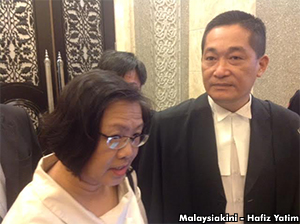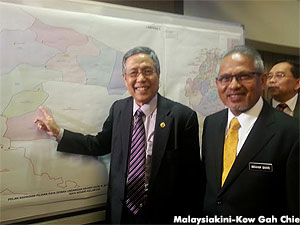The Elections Commission (EC) has gotten away with giving Sarawak a highly malapportioned electoral system not reflective of democracy and the principle of ‘one vote one value’, says Rise of Sarawak Efforts (Rose).
The NGO, which works on democracy and rural transformation, said this in response to the Federal Court's decision yesterday which ruled that the Sarawak election boundary redrawing exercise as valid .
“The decision slammed shut whatever democratic space hitherto available that enabled voters or citizens to participate in a democratic process of redelineation of the electoral boundaries of our constituencies,” team leader Ann Teo said.
 The appeal was filed by Batu Lintang assemblyperson See Chee How (
photo
) and Baram voter Pauls Baya.
The appeal was filed by Batu Lintang assemblyperson See Chee How (
photo
) and Baram voter Pauls Baya.
Rose described the ruling by the highest court in the country as abdicating and divesting itself of its most important function - that of upholding the principle of separation of powers between the executive, legislature, and judiciary.
“Reportedly, the Federal Court ruled that since the EC’s delineation final report on Sarawak delimitation had been submitted to Prime Minister Najib Abdul Razak, it was now an ‘academic’ issue and thus, no longer fell within the jurisdiction of the courts,” it said.
The decision not to grant leave to appeal the case on constitutional grounds, said the NGO, is reflective of the “poor health” of democratic institutions in Malaysia.
The NGO said EC’s redelineation proposal for Sarawak made public participation difficult and onerous.
EC, it added, must take heed of what it will be facing following yesterday's Federal Court's decision, which it described as disappointing but not surprising.
Voter participation in redelineation is an internationally recognised practice, which the NGO said doesn’t get the respect it deserves in Malaysia.
“How can a voter or a group of 100 voters even begin to have a say in the process of how electoral boundaries are re-drawn when the notice and map published and issued by the EC lacked many details?” Teo asked.
Teo said the apex court's decision denotes a contentious redelineation exercise for Sabah and Peninsular Malaysia, which is set to take place soon.
“Should the EC decide to continue riding roughshod over voters the way that it has done for Sarawak, when redelineating Sabah and Peninsular Malaysia, then the EC can only expect more objections and court cases filed in Sabah and Peninsular Malaysia by informed voters,” Teo warned.
Far cry from 2005 exercise
Teo pointed out that the level of information and detail given by EC in the recent 2015 delimitation recommendations is a far cry from the one published in the EC’s 2005 exercise.
“One just needs to read EC’s 2005 final report to realise the vast difference. In 2005, the EC already employed a computerised geographical system to come up with its proposals called the ‘Election Geographical Information System' (EGIS).
 “We believe that EC has the improved systems that can provide far better information and details to the public in its 2015 recommendations but for reasons of its own, chose to reduce the information to the public (compared to in 2005). This can only increase public mistrust of the EC.” Rose said
“We believe that EC has the improved systems that can provide far better information and details to the public in its 2015 recommendations but for reasons of its own, chose to reduce the information to the public (compared to in 2005). This can only increase public mistrust of the EC.” Rose said
Teo said EC’s 2015 recommendations do not meet international standards or practice and thus, do not inspire confidence.
Rose further criticised EC's conduct and actions in the Sarawak delimitation as well as its actions in the conduct of this court case.
The NGO said it has exposed for all to see that EC had fallen short of its vision and mission.
Rose urged civil society organisations working on the issues of malapportionment and gerrymandering of electoral boundaries to act fast to educate voters, mobilise, and prepare to submit objections, including the filing of possible court cases.
It said the regressive and undemocratic decision has not dampened Rose’s activities - to empower voters and work towards building a society where voters substantively engage and participate in the democratic process.
“The recent apex court decision has only given greater meaning to our work and emboldened our resolve to increase and enlarge democratic space and voters’ rights,” Teo added.

